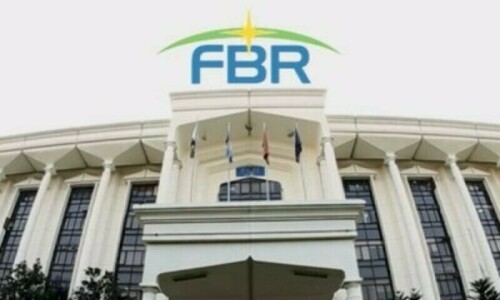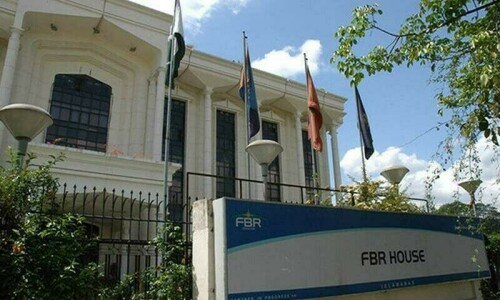• Paid Rs367.8bn in FY24, against textile sector’s Rs111.23bn
• Banks’ contribution rises to Rs946bn; petroleum products share Rs413.48bn
ISLAMABAD: The salaried class emerged as the third-largest contributor to income tax collection in the outgoing fiscal year (FY24), following closely behind banks and petroleum products, and still surpassing the country’s affluent textile exporters.
The banking sector contributed Rs946.08 billion to income tax collection in FY24, a significant 66 per cent increase, from Rs568.68bn in FY23. This represents a substantial rise in the sector’s share of income tax collection, from 17.39pc in FY23 to 20.88pc in FY24.
This trend suggests that higher bank profits lead to a greater contribution to income tax revenue. However, it’s worth noting that banks contribute relatively little to sales tax, federal excise duty, and customs collection.
The salaried class contributed Rs367.8bn to income tax collection in FY24, a 39.42pc rise, from Rs263.8bn in FY23. Interestingly, this contribution exceeds that of wealthy textile exporters by Rs276.57bn, even though they exported $16.655bn worth of goods in FY24.
The textile sector contributed Rs111.23bn to income tax collection in FY24, a 7.4pc increase, from Rs103.56bn in the previous year. The government modified the fixed tax regime for exporters and increased the rate in the budget.
Petroleum products (POL) remained a significant contributor to federal taxes, generating a total revenue of Rs1.195 trillion in FY24, up 5pc from Rs1.138tr in the previous year. Within this sector, income tax collections rose 6pc to Rs413.48bn, from Rs388.75bn in the previous year.
The sales tax revenue generated from petroleum items was Rs457.88bn, marking a 2.27pc increase, from Rs447.71bn in the previous year. Customs revenue from POL also rose, reaching Rs310.62bn, up 7.1pc from Rs289.89bn in the previous year. In addition to the taxes on petroleum products, the government also collects a petroleum development levy on them.
The power sector is another area that has emerged as a significant revenue generator for the FBR. Tax collection from the power sector increased by 38.7pc to Rs640.61bn in FY24, up from Rs461.95bn in the previous year.
The highest collection in the electricity industry was from sales tax, which amounted to Rs411.005bn compared to Rs293.18bn in the previous year, an increase of more than 40pc. This was followed by income tax collection of Rs219.39bn in FY24, a 46.2pc increase from Rs150.06bn in the previous year.
The high taxation on petroleum products and electricity has exacerbated the burden on the public, resulting in increased bills and transportation costs. These factors have significantly contributed to the overall inflation rate in the country, which reached 23.41pc in FY24.
The sugar sector, largely owned by political elites, contributed a relatively low amount to tax collection. The total tax collection from this sector in FY24 was Rs135.24bn, a 30pc increase from Rs103.89bn in the previous year.
However, the bulk of this increase can be attributed to higher sales tax collection from consumers, which rose by 29.56pc to Rs115.39bn, up from Rs89.07bn in the previous year.
The sugar sector’s contribution to income tax is negligible, standing at Rs15.54bn compared to Rs12.43bn in the previous year, representing a 25.02pc increase. Last year, millers were authorised to export sugar in addition to earning money from domestic sales.
The telecom sector is another area of growth, with overall revenue rising to Rs187.19bn in FY24, a 16.8pc increase from Rs160.30bn in FY23. Income tax revenue from this sector also saw a significant increase, reaching Rs144.35bn, up 14.11pc from Rs126.49bn in the previous year. This includes withholding tax collection, as telecom companies act as withholding agents for income tax on mobile phone cards and data usage.
The increased income tax collection is largely attributed to withholding tax on mobile phone cards, which has remained largely unchanged.
The pharmaceutical sector, which is experiencing a boom, saw its tax contribution increase to Rs100.63bn in FY24 from Rs98.15bn in the previous year, representing a modest 2.5pc rise. However, income tax collection from this sector actually declined by 2.5pc to Rs46.61bn in FY24, compared to Rs47.81bn in the previous year.
The multibillion-dollar pharmaceutical industry contributes a relatively small amount to income tax, despite exporting products from the country and charging high domestic prices to consumers.
Published in Dawn, August 4th, 2024














































Dear visitor, the comments section is undergoing an overhaul and will return soon.